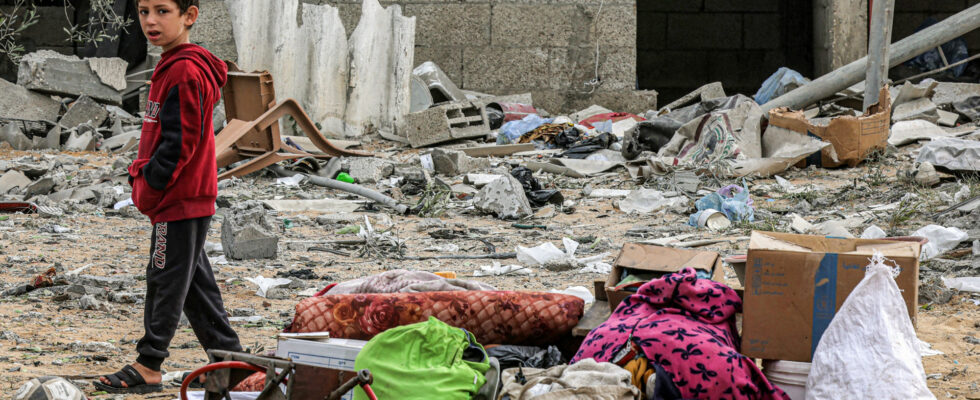Early Tuesday, Hamas reported 70 deaths overnight, including 13 in airstrikes near Rafah, a town at the southern tip of Gaza where 1.5 million Palestinians are crowded together, the majority of them displaced. by the violence in the rest of the territory. And rocket alarms sounded around Gaza, according to the Israeli military. On Monday, and for the first time since the start of the war, the UN Security Council adopted by 14 votes in favor and one abstention – that of the United States – a resolution calling for a “ceasefire” . Israel’s historic ally, Washington had until now opposed the term “ceasefire” in UN resolutions, blocking three texts to this effect.
The text “demands an immediate ceasefire for the month of Ramadan” – which began two weeks ago -, should “lead to a lasting ceasefire”, and “demands the immediate and unconditional release of all the hostages. Not implementing this resolution would be “unforgivable”, judged UN Secretary General Antonio Guterres in the wake of the vote welcomed by major capitals.
The main information to remember:
- For the first time since the start of the war, the UN Security Council adopted a resolution on Monday calling for a “ceasefire”
- However, air raids and clashes continue this Tuesday in the Gaza Strip
- On the ground, the situation remains critical for the 2.4 million inhabitants of the narrow strip of land, subject to a total blockade and threatened with famine.
Israel vs. Washington
As soon as the text was adopted, Israel canceled the visit of an expected delegation to Washington, declaring that the American abstention “harmed” both its war effort and its efforts to free the hostages held in Gaza. “This is a clear step back from the United States’ consistent position in the Security Council since the start of the war” on October 7, Prime Minister Benjamin Netanyahu’s office said.
“We do not have the moral right to stop the war as long as there are hostages in Gaza,” retorted Defense Minister Yoav Gallant, visiting the United States. “The outcome of this war will shape the region for years to come,” he insisted, emphasizing Israel’s need to “defeat” Hamas to ensure its security. Former United States President Donald Trump, often called the most pro-Israeli American head of state, said Monday in an interview with the Israel Hayom daily that Israel must “finish” the war in Gaza because he is losing “a lot of support” around the world.
“Protect” Gaza
Hamas “welcomed the UN Security Council’s call for an immediate ceasefire” and accused Israel of the “failure” of the talks – under the aegis of Qatar, Egypt and the United States – for a truce of several weeks coupled with the release of Israeli hostages and Palestinian prisoners.
In the Gaza Strip, residents met by AFP welcomed the vote at the UN while calling on Washington to use its influence on Israel to obtain a ceasefire. “America must protect Rafah as it protected Israel,” said Bilal Awad, a displaced person from the town of Khan Younes (south).
“Not even food”
On the ground, the situation remains critical for the 2.4 million inhabitants of the narrow strip of land, subject to a total blockade and threatened with famine according to the UN and international organizations. At least two large hospitals, accused by Israel of housing Hamas bases, are targeted by army operations, a week after the start of the intervention against the al-Chifa hospital in Gaza City, the most large area.
This hospital and its surroundings were targeted by artillery fire on Monday, according to Hamas, as were the surroundings of the al-Amal hospital in Khan Younes. The Palestinian Red Crescent announced overnight that it had evacuated 27 members of its staff to al-Amal, after the evacuation on Sunday of displaced people who had found refuge there. In Jabaliya, in the north, residents, many of them women and children, queued on Monday to fill cans of water which they carried in wheelbarrows, carts or by force of their arms.
“We don’t even have food to give us the energy to fetch water, let alone innocent children, women and the elderly,” said one man, Bassam Mohammed al-Haou.
Humanitarian aid banned by Israel
Arriving mainly from Egypt via Rafah, humanitarian aid is strictly controlled by Israel and enters the Gaza Strip in dribs and drabs, prompting foreign governments to airdrop food packages. Faced with this major humanitarian crisis, the UN agency for Palestinian refugees (UNRWA) announced on Sunday that it was now formally prohibited by Israel from any delivery of food aid to the north of the territory, where the situation is particularly dramatic.
“People die to get a can of tuna,” said Mohamad Al-Sabaawi, a resident of Gaza, brandishing the only can of tuna he was able to collect at the camera. Not far away, another man told AFP he was risking his life for a can of beans “which will be shared with 18 people”.
